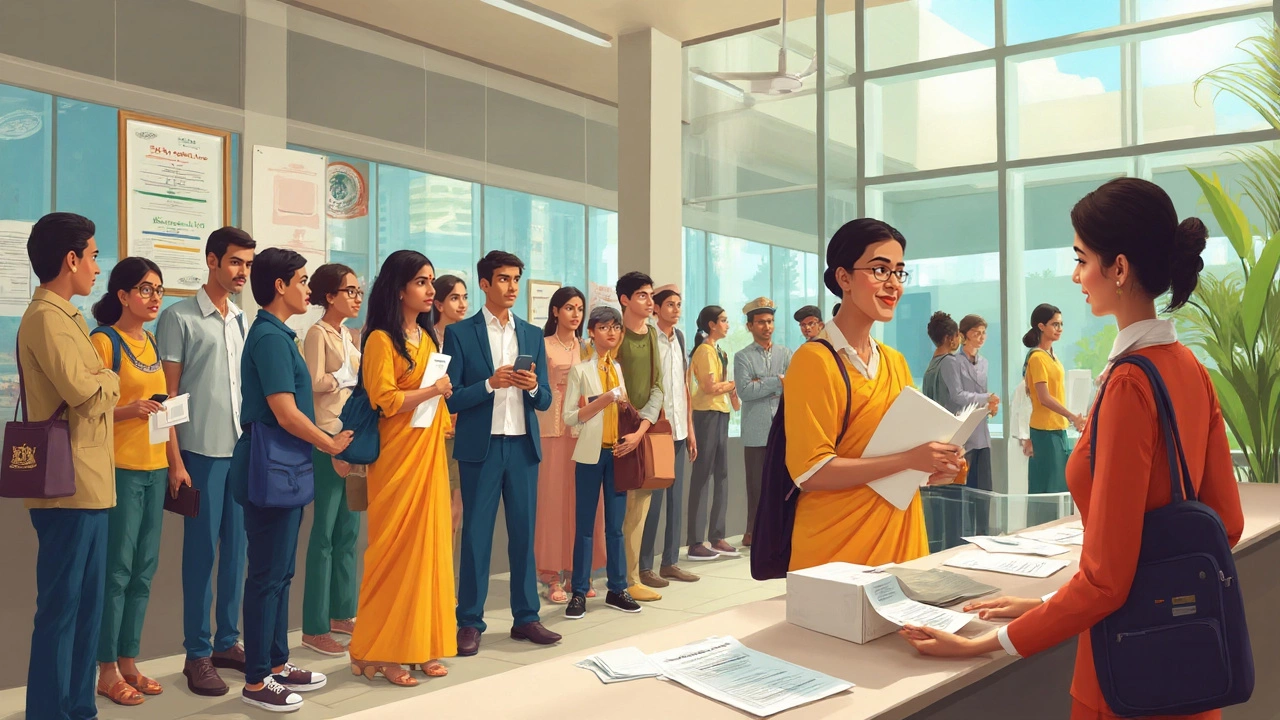
Imagine spending years (and probably a good chunk of money) on a diploma, only to find out later that it’s not worth the paper it’s printed on in India. Sounds a bit scary, right? For a lot of people, that worry is real. Recognition of diplomas in India can be a maze—full of odd official rules, old approval letters, new policies, and more than a little confusion. If you’re hoping to work, study further, or just use your diploma in India in 2025, you’ve got to know the rules of the game. You can’t just assume any diploma is good everywhere, because India’s got its own standards.
How Diploma Recognition Really Works in India
So, what does it actually mean for a diploma to be ‘recognised’ in India? At first glance, it sounds simple—recognition must mean being accepted by the Indian government, right? It’s not always so black-and-white. There are different authorities, approvals, and sometimes you run into that golden phrase—‘equivalent to’—which can make or break your career options.
The key player here is the All India Council for Technical Education (AICTE). For technical, management, and computer courses, if the diploma you have isn’t approved by AICTE, it’s in trouble. The University Grants Commission (UGC) watches over universities and academic diplomas. There’s also the National Board of Accreditation (NBA), which checks the quality of very specific technical programs. And if you’re talking about school-level diplomas, like the ones you get after Class 12 or Class 10, you’re looking at boards approved by the State Education Department, the Council for the Indian School Certificate Examinations (CISCE), or the Central Board of Secondary Education (CBSE).
If you earned your diploma in India, always look for the stamp of these agencies. It’s like a backstage pass—they prove your course meets baseline standards set nationally. For diplomas from private colleges, make sure the institution is affiliated with a reputed university, has AICTE/UGC approval, or is a government polytechnic. Polytechnics, for example, are legendary for hands-on skills, but not every one has the same standing. Government polytechnic diplomas are usually recognised everywhere. Private ones? Double check!
Now, let’s throw in foreign diplomas. Maybe you studied in London like me, or you took an online course from Australia during lockdown. For a foreign diploma to work in India, you’ll need something called equivalence. This means an Indian authority, like the Association of Indian Universities (AIU), will look at your diploma and say, yes, this is equal (or not) to an Indian degree or diploma. Without equivalence, that foreign diploma might just gather dust in your folder.
Ever wondered why there are so many stories of people not getting selected in a government job because their diploma said ‘distance mode’ or ‘online’? Distance and online education are legal in India—but only if the specific programme is cleared by the Distance Education Bureau (a branch of UGC). The 2018 UGC notification was a game changer. Now, open and distance learning (ODL) and online diplomas have clear recognition norms, but only certain subjects and only from listed institutions. If your programme isn’t on their list, you might find doors closed.
Don’t confuse a certificate with a diploma either. In India, a ‘diploma’ means at least a year of focused study, often after Class 10 or 12, with a specific skill outcome like engineering, pharmacy, or design. A certificate could be a weekend course—useful on your CV, sure, but it won’t be enough to get you into a government post or a professional council.
The recognition scene is strict in some sectors—healthcare, teaching, engineering, law. Professional councils like the Indian Nursing Council, Bar Council of India, Council of Architecture, and Pharmacy Council will have their own lists of approved diplomas. If your diploma isn’t on their list, you can’t practice, even if the college was shiny and new. In 2023, for example, the Medical Council turned away hundreds of students with foreign allied health diplomas because of missing paperwork or lack of equivalence letters. This stuff matters.
The bottom line: checking diploma recognition isn’t optional. Always check the institution’s approval status on the relevant official website (AICTE, UGC, Distance Education Bureau, or the right professional council). Don’t just take the word of college staff—they’re not the ones issuing government jobs or professional licenses.

What Happens If Your Diploma Isn’t Recognised?
This is the part that can catch people off guard. If your diploma isn’t officially recognised in India, you might still be able to get a job—or you might not. The outcome depends a lot on what you’re trying to do.
For government jobs (central, state, municipal), there’s zero wiggle room. If the job description says ‘Diploma in Mechanical Engineering from a recognised institution’, they mean exactly that. If your diploma isn’t on the official list—sorry, you’re out. Even private sector companies, especially the big ones, often ask for UGC, AICTE, or professional council recognition. Large Indian companies tend to play it safe. They know if they hire someone with an unrecognised diploma, it’ll mess up their audits and compliance paperwork.
On the other hand, small startups, family businesses, and some parts of the tech sector, might not care as much. They’ll judge you on skills, not stamps. But even there, if you want to climb higher—go abroad, apply for professional memberships, or get official promotions—you’ll hit a glass ceiling with an unrecognised diploma.
If further studies are on your mind, Indian universities are strict. Whether you apply for a Bachelor’s or go for a lateral entry into engineering, they’ll check your diploma’s recognition. If AIU or UGC doesn’t list your course as equivalent, your application’s out. I’ve seen people spend months and thousands printing transcripts, only to be told they don’t qualify.
What about jobs abroad? Here’s a surprise—Indians working in the Gulf, the UK, or Canada are often required to show their Indian diploma has ‘attestation’ or ‘apostille’ from the Ministry of External Affairs. But first, the diploma must be recognised in India. Not recognised? No attestation. No visa. Case closed.
If you find yourself stuck with an unrecognised diploma, don’t panic. There are a few moves you can make. First, check if you can get your diploma recognised retroactively. Sometimes, colleges gain official status after you graduate. If not, see if there’s an option to do a ‘bridge course’ or extra exam. Pharmacy, architecture, and nursing sometimes allow this. Otherwise, use your diploma as a stepping stone in industries that focus more on your portfolio and practical skills. It might not get you a government job, but you can still make it work for you.
Don’t forget about legal verification. Recruiters—especially for finance, law enforcement, or high-profile jobs—often run background checks through third-party services. A dodgy or unrecognised diploma can cost you a dream job at the last minute. If your diploma is from a private college or online portal, always keep copies of government approvals, or NOCs (No Objection Certificates), saved in your email. Trust me, it saves a lot of last-minute headaches.
It’s worth noting, technical diplomas from government institutes (like those run by the Directorate of Technical Education, DTE, in each state) are almost universal in their acceptance. If your goal is stability or a public job, these are safe bets. Even private colleges that tie up with public universities or polytechnics can be a good middle ground—but the affiliation and approval must be real, not just pretty logos on a website.

Tips for Choosing a Recognised Diploma (and Avoiding Traps)
If you’re considering a diploma now, or thinking about going back to college, this is where you want to pay most attention. It’s pretty easy to get wowed by flashy ads or promises of ‘placement guaranteed’. But real recognition has nothing to do with marketing—it’s about government rules, official agencies, and solid paperwork.
First step: always check the college or institute’s official approval number. This should be available on the AICTE or UGC websites. Don’t make the mistake of just checking the college’s own site. If you’re not sure, email the council or ring up their helpdesk—most are surprisingly quick to reply now, since digital reforms after the pandemic.
If you’re looking at a vocational diploma—think electrician, plumber, hairdresser—see if it’s listed under the National Skill Development Corporation (NSDC), the National Council for Vocational Training (NCVT), or the State Council for Vocational Training (SCVT). Skill-based diplomas are popular in India because they land jobs fast. But again, don’t skip the approval check. You want a diploma that’s portable across state lines, not stuck in one city.
Planning to study abroad, online, or in partnership with a foreign university? Get written confirmation (email or letter) that your diploma is recognised by the Association of Indian Universities or your target sector’s professional council. If they hesitate, that’s a red flag. Foreign diploma holders in India often have to submit extra paperwork for government job forms, especially in regulated fields.
An important tip: keep an eye on annual government notifications. Recognition status can actually change from year to year. A college or course that’s approved this year may lose approval if it falls short on standards, faculty, or infrastructure. Always check the most current lists before sending your hard-earned fees.
If you’re already in a program, check for regular renewal of recognition. Ask for a copy of the official document. Don’t feel shy—this is your money and your time at stake. Most reputable colleges have nothing to hide and will share a PDF or scanned letter right away.
Watch out for the difference between ‘autonomous status’ and ‘recognised institution’. Some big private colleges are ‘autonomous’—they can make their own exams and syllabi. But recognition still has to be granted by a government body or university. Don’t mix up the two. Autonomous doesn’t equal government-approved unless you see the exact order and reference number.
And if you’re still unsure, remember this: ask people who’ve been there. Search out alumni in your course on LinkedIn—drop them a polite message. Did they get good jobs? Did their diploma get accepted? You’ll get the inside scoop faster than reading prospectus fine print or trawling through old forums.
The extra step pays off. The Indian education system may look confusing, but it’s all about paperwork, approvals, and due diligence. Place your trust in official lists, emails from government councils, and the experiences of recent graduates—not just glossy brochures. The world of diplomas in India is changing fast, and knowing what’s really diploma recognition India can save you from losing out on jobs, future study, and peace of mind. Don’t let your hard work go to waste—do your homework first.
